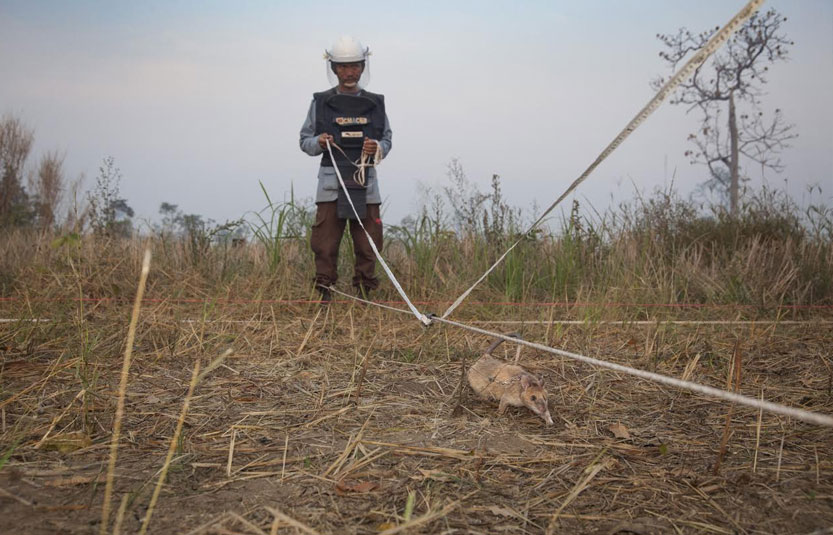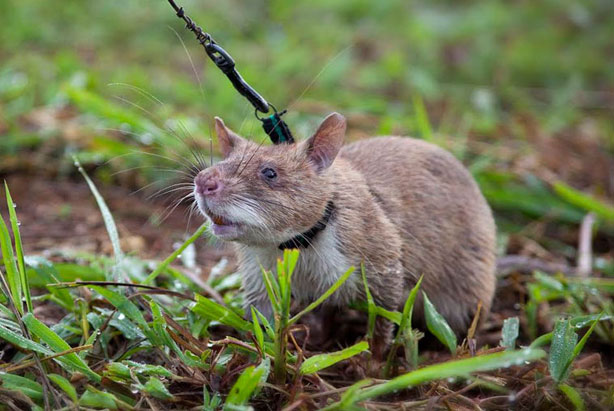A Nose for Trouble: Giant mine-detecting rats save lives in Africa and Southeast Asia

Meas Chanroeun and Merry the HeroRAT, searching for landmines near Siem Reap, Cambodia. The project, initiated by non-profit Apopo, uses African giant pouched rats to detect landmines using their sense of smell. Image courtesy of Lauren Crothers/SparkNews
CAMBODIA— Merry doesn’t sleep much at night. In spite of this, she’s usually up before the sun, and then driven to work along with 11 of her colleagues. They work for a few hours in the early morning, napping and drinking water between shifts. Her job, detecting landmines and other unexploded ordnance (UXO), requires a laser-like focus. It also helps that at about a kilo in weight, she’s very light of foot and does not set off the mines.
Merry is an African giant pouched rat, or Cricetomys gambianus, a docile and exceptionally smart rodent with superior olfactory abilities. She’s one of a team of “HeroRATs” bred, trained and deployed by the Belgian nonprofit APOPO, which is headquartered in Tanzania. After working successfully to help detect mines in Mozambique for more than a decade, and in Angola since 2013, the organization partnered with the Cambodian Mine Action Centre (CMAC) in 2015.
Cambodia is one of the most mine- and UXO-contaminated countries in the world. At least 500,000 tonnes of ordnance was dropped by the United States as the war spilled over from Vietnam, while decades of conflict from the 1970s onward saw millions of mines laid throughout the country. According to the 2016 Landmine and Cluster Munition Monitor, more than 1,600 sq. kilometers of land are still contaminated by mines and other explosive remnants of war.
The impact on communities has been nothing short of devastating. According to the latest figures from the Cambodia Mines/UXO Victim Information System, more than 64,000 casualties were recorded between 1979 and February of this year. Of these, nearly 20,000 people were killed. CMVIS said there have been more than 9,000 amputations recorded; other sources put the figure at nearly three times that number.
Down a dirt path in Varin district’s Srenoy commune, about 25 kilometers from the Thai border, lies the village of Dai Ouv. It’s home to more than 2,000 people and a 3,600-meter-long minefield that has blighted the tranquil landscape for decades. By April 8 of this year, Merry and her clawed comrades, along with their human counterparts, were expected to have cleared the entire area, having put paws on the ground on February 1.
Pok Nin, a resident of Dai Ouv, always had a heightened sense of fear when he tried to grow crops; one man he knew was killed after stepping on a landmine, while another had a very close call when his tractor triggered one in a field.
Like others, he was skeptical about the rats’ ability to clear mines. “Cambodian rats run everywhere and eat everything,” Nin said. “I was doubtful.”
But in February, he was handed a mine-free, 300 x 50-meter plot of land that the rats had cleared. “It has changed my life,” he said.
Once their little harnesses are on, the rats mean business. Tethered to a cable that extends across a 10 x 20-meter grid and attached to handlers on either side, they work the ground with their noses, inch by inch, back and forth. They do this swiftly: the rats are able to check an area the size of a tennis court in 30 minutes. When a rat smells TNT, the explosive compound found in most landmines, it will stop and focus on that one area before scratching lightly at the soil. Once the scent is confirmed, the teams begin a careful excavation to uncover what lies beneath.
“The impact has been big,” said Vendeline Shirima, APOPO’s international mine-detection rats supervisor from Tanzania. “People would say it was crazy, but when we started clearing Mozambique, they saw it was pretty amazing. We never miss mines using rats.” Mozambique was officially declared mine-free in September 2015, and the country’s National Institute of Demining has asked APOPO to stay and complete residual tasks, such as an exploded bunker area in Maputo.
Specially trained HeroRATs have also proven successful at sniffing out tuberculosis in Tanzania and Mozambique. According to APOPO, the rats have identified more than 11,000 TB cases missed by government clinics, increasing detection rates by over 50 percent in 2016.
In addition to landmine detection in Cambodia, Mozambique and Angola, the rats will soon begin operations in Zimbabwe. The NGO has also just announced its expansion into Colombia, where, after acceptance by the government, it is hoped the rats can help tackle the problem of improvised explosives that do not contain much metal and are therefore harder to detect using traditional equipment.
Sister Denise Coghlan works in Cambodia as part of the International Campaign to Ban Landmines team that was awarded the 1997 Nobel Peace Prize. “They’re interesting-looking creatures,” she said of the HeroRATs. “I think anybody that can contribute to mine clearance and eradication of the problem is an asset.”
Coghlan and Shirima both noted that funding is one of the major challenges in mine clearance. The use of rats is cost-effective in the long term, as their basic needs—water, food and a clay pot to bed down in—are inexpensive. (A special program allows people to “adopt” a HeroRAT online and help defray the costs.) They are also able to cover more ground in a shorter amount of time than a person with a detector, speeding up operations and leaving funds for further tasks, or for checking a wider area for explosives.
Back at home in their freshly cleaned clay pots and sated by a hearty meal of banana and peanuts, Merry and her colleagues settled in for the rest of the day. Come sunrise, they’d be back out in this quiet corner of Cambodia again, noses to the ground.
For more info about APOPO go to – www.apopo.org.
If you would like to support APOPO why not adopt a HeroRAT (https://goo.gl/pmyaxz.)?
- Latest
- Trending






























